We warmly welcome you to MNE 2023. After Rhodes (2019), Turin (2021) and Leuven (2022), the International Conference on Micro- and Nano Engineering (MNE) series will take place in Berlin in September 2023. This will be the 49th edition of the conference series, which began in Cambridge in 1975.
The MNE conference is the flagship event of the International Society for Micro- and Nanotechnology (iMNEs). It has always been the leading international conference for micro- and nano-fabrication, manufacturing techniques, as well as applications of the fabricated micro/nanostructures, devices and microsystems into electronics, photonics, energy, environment, chemistry and life sciences. The MNE brings together researchers and experts from all over the world to meet and discuss the latest research results and their applications. Furthermore, the conference aims to promote, involve and train young talent in the field of micro and nano engineering.
Just like in 2011, it is our great pleasure to cordially invite you – the experts in the field of micro and nano engineering – to meet up in Berlin, the capital of Germany in the heart of Europe. At the 3-day conference you will have the opportunity to follow 4 parallel sessions, plenary and invited talks, oral and poster presentations from renowned researchers, experts and users. All entries will be reviewed and evaluated by an international technical program committee. MNE poster contributions have the same significance as oral presentations. A sound commercial exhibition complements the MNE program to foster a lively exchange of the latest technologies, materials and applications.
The MNE committees encourage all authors to submit papers (regular, accelerated papers, reviews, or news and opinion) for four thematic open access editions of Elsevier’s “Micro and Nano Engineering” related to the conference themes.
We are looking forward to welcoming you to Berlin in September 2023!
Please have a frequent look at this website as more information will follow.
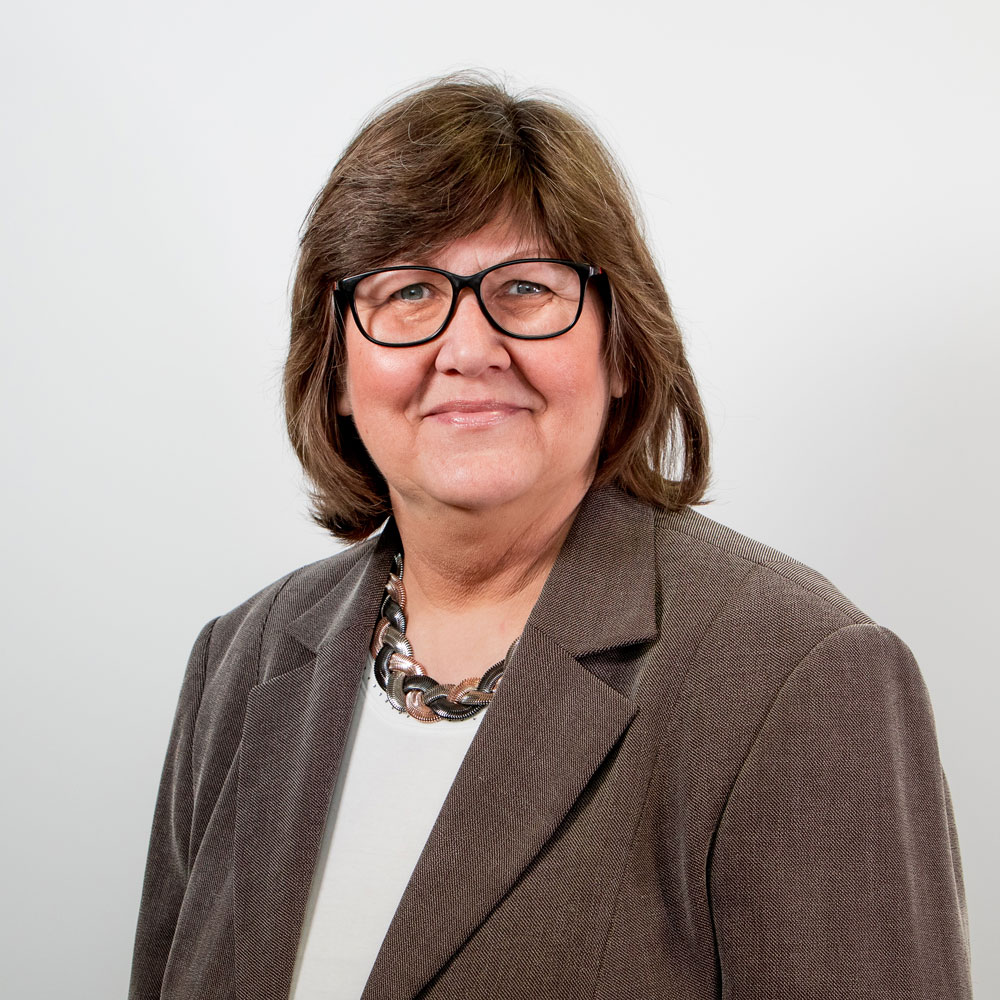
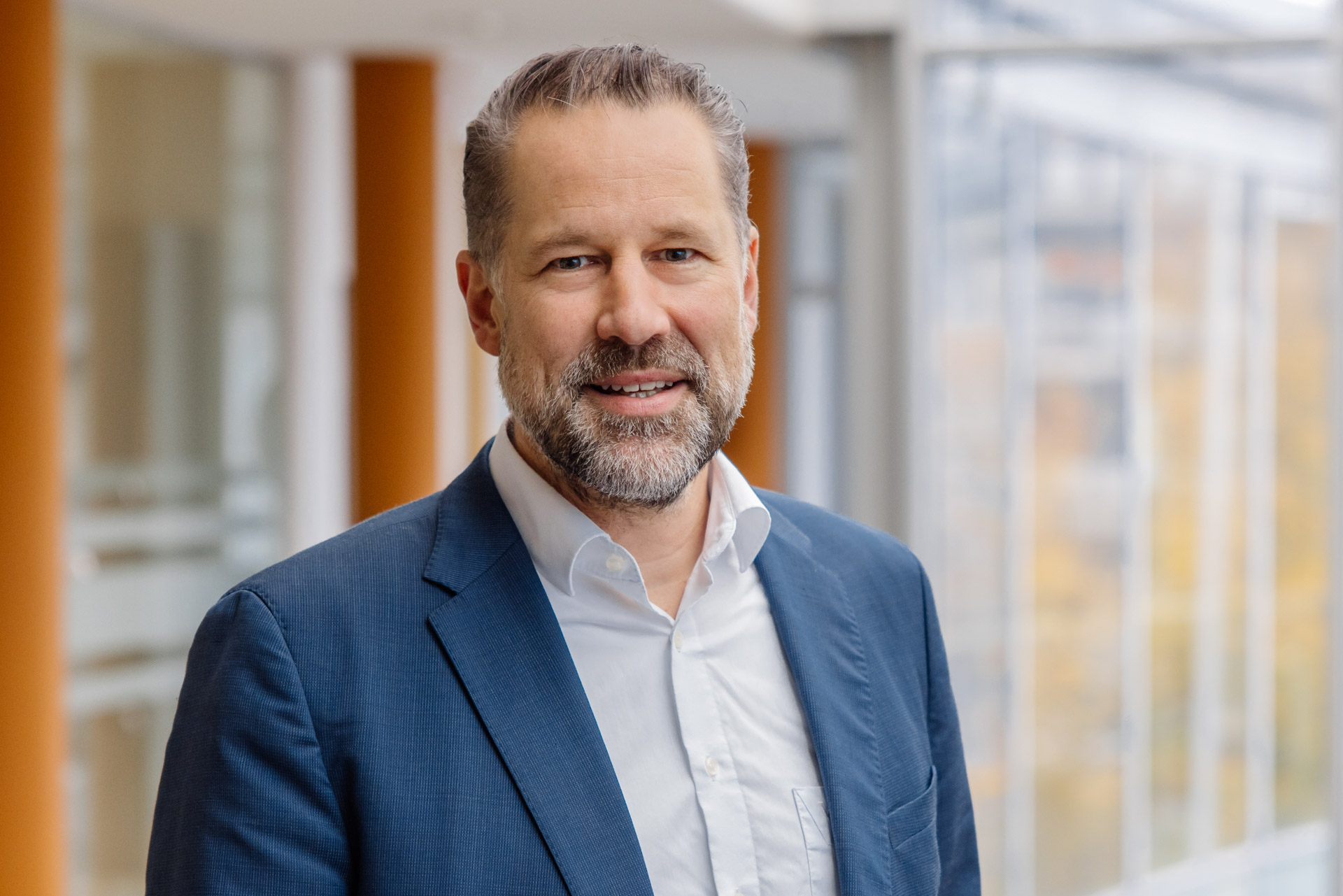
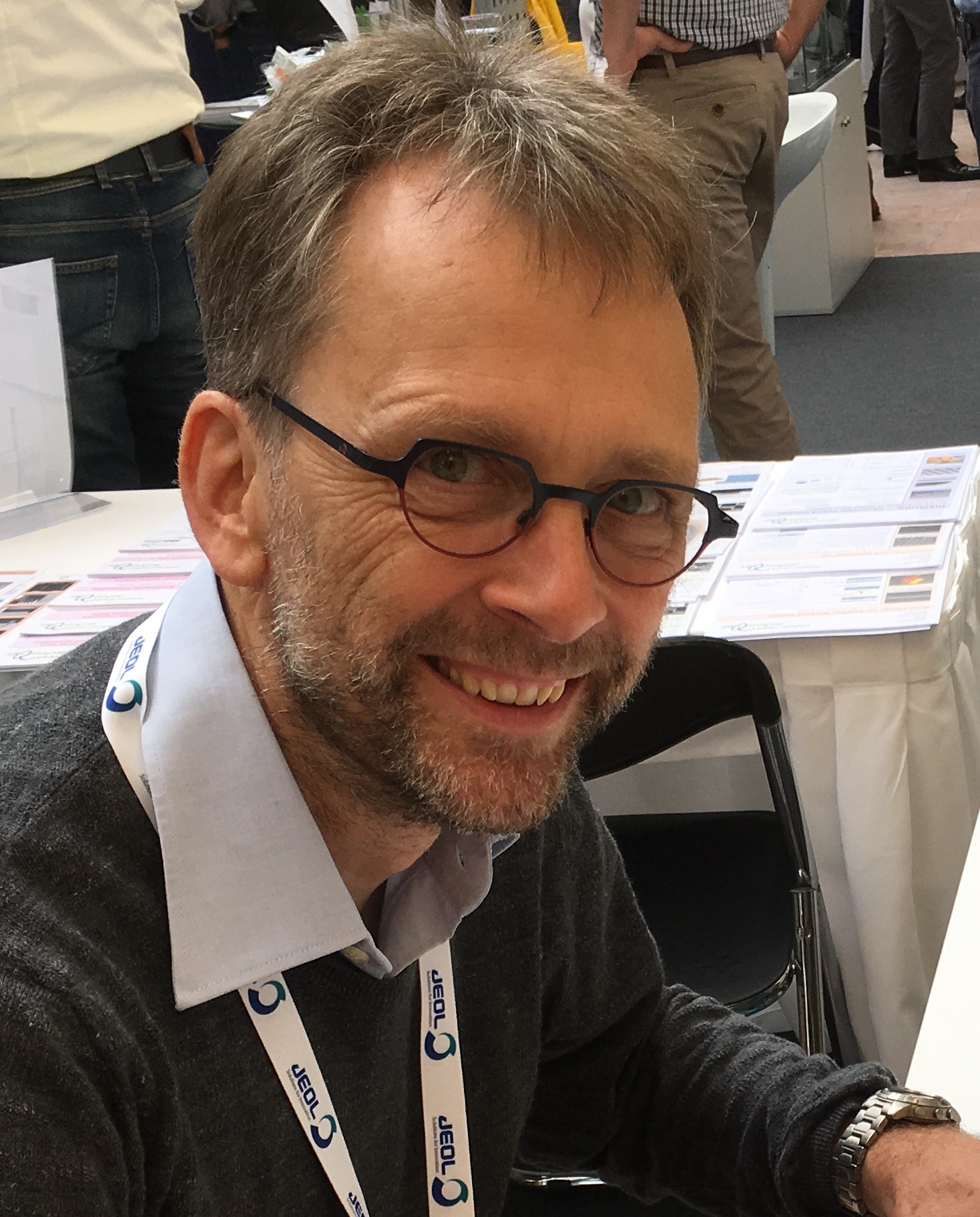
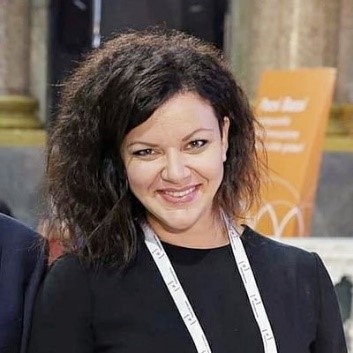
Francesca Santoro received her Bachelor’s and Master’s degrees in Biomedical Engineering at the ‘Federico II’ University of Naples (Italy) with specialization in biomaterials. She received a PhD in 2014 in Electrical Engineering and Information Technology in a joint partnership between the RWTH Aachen and the Forschungszentrum Juelich (Germany). In October 2014, she joined Stanford University (USA) and received a research fellowship in 2016 by the Heart Rhythm Society. She joined IIT in July 2017 as Principal Investigator of the 'Tissue Electronics' lab. In 2018 she has been awarded the MIT Technology Review Under 35 Innovator ITALIA and EUROPE. She has been awarded an ERC Starting Grant in 2020. She is among the Inspiring Fifty Italy and Europe and is also the winner of the Falling Walls Science Breakthrough of the Year in Engineering and Technology in 2021. Since January 2022, she is Professor in Neuroelectronic Interfaces at RWTH Aachen and Forschungszentrum Juelich. She has been recently selected as a PI in the Interstellar Initiative by the New York Academy of Science and is the recipient of the prestigious Early Career Award by the German National Academy of Science Leopoldina.

Dr. Robert Chau is an Intel Senior Fellow and director of Intel Europe Research. He is responsible for establishing Intel’s semiconductor and packaging R&D infrastructures across Europe and expanding its R&D partnership with pan-European RTOs, academic research institutions, and local industries. Prior to taking on this role in June 2022, Dr. Chau was the general manager of Intel Components Research (CR) in the Technology Development group for 9 years, responsible for driving Intel’s internal R&D to enable Moore’s Law and beyond while managing a 300mm Fab (RP1) for research and pathfinding in Oregon, U.S.A. Under Dr. Chau’s leadership CR delivered many industry-first innovations such as PowerVia architecture, nanoribbon-FET, Foveros Omni interconnect for packaging, directed self-assembly patterning, and a 300mm GaN device and process technology. A 35-year Intel veteran, Dr. Chau holds more than 480 issued U.S. patents and was the recipient of the 2015 Intel Inventor of the Year Award on Intel’s FinFET technology. He received numerous semiconductor industry awards including the 2012 IEEE Jun-ichi Nishizawa Medal for his pioneer work on strained Si and high-k gate dielectrics. Dr. Chau is an IEEE Fellow and an elected member of the U.S. National Academy of Engineering.
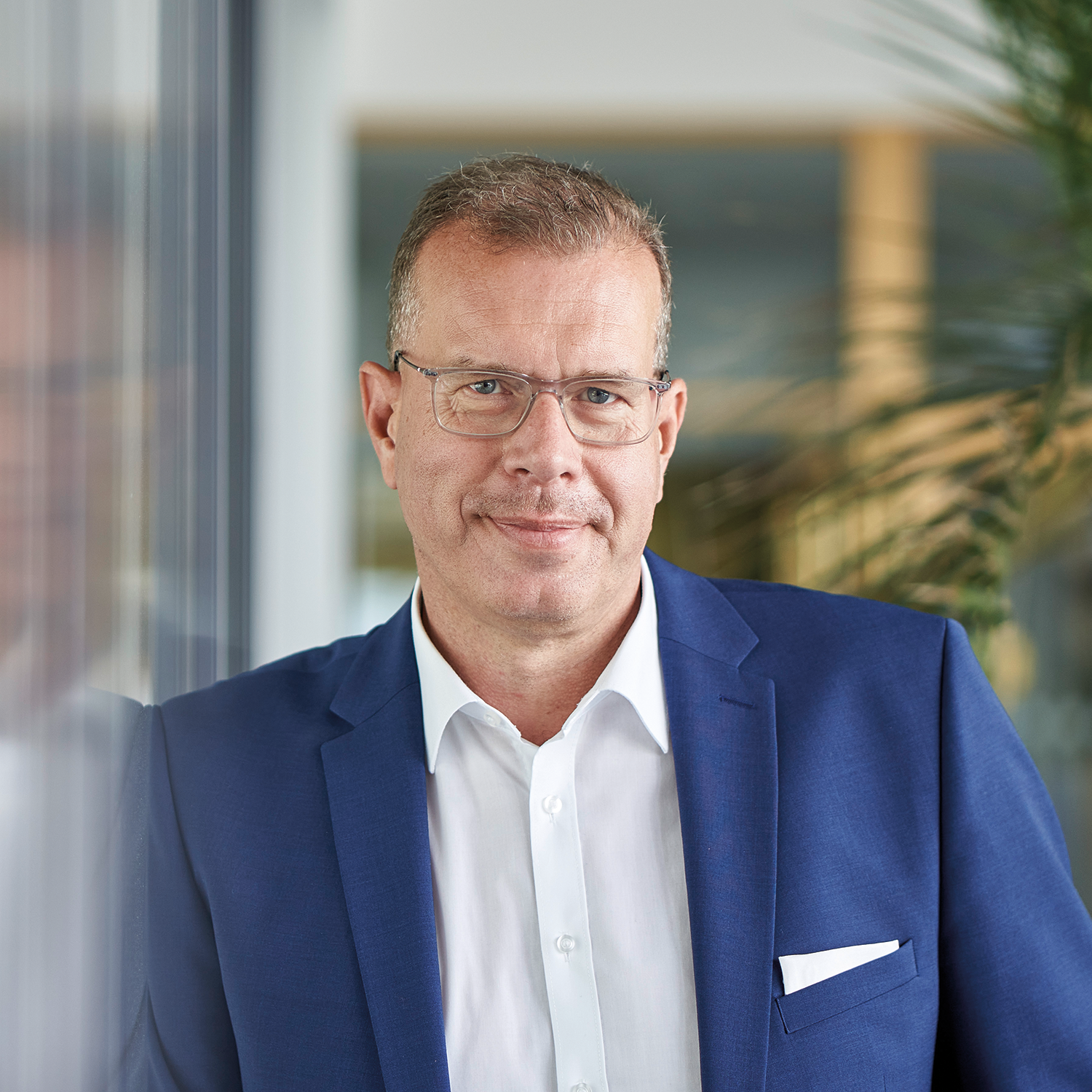
Andreas Tünnermann - CV
Andreas Tünnermann was born in Ahnsen, Germany, on June 10th, 1963. He received the diploma and Ph.D. degree in physics from the University of Hannover. He was head of the department of laser development at the Laser Zentrum Hannover from 1992 to 1997. In the beginning of 1998 he joined the Friedrich-Schiller-University in Jena, Germany as a Professor and Director of the Institute of Applied Physics. In 2003 he became the Director of the Fraunhofer Institute of Applied Optics and Precision Engineering. Andreas Tünnermann enjoys an excellent reputation in the laser physics community, and is currently leading one of the most creative and productive photonic research groups in the world. The research interests of Andreas Tünnermann are focused on fundamental principles as well as sophisticated technical aspects and applications associated with the tailoring of light.
In 1995, his group at the Laser Center Hannover demonstrated the extraction of 9.2 W power from a Neodymium-doped fibre laser with diffraction-limited beam quality. At that time, this record result changed the view of fiber lasers in the entire laser community: from laboratory curiosity to a laser scheme with extraordinary potential. Applying novel fiber designs and experimental strategies, Andreas Tünnermann and his team were able to scale the output power of these systems to the multi-kW range. This groundbreaking work yielded a variety of developments in laser technology and has found many advanced applications in basic science and industry. Major laser companies have adopted these concepts to develop advanced solid-state lasers. Based on advanced ytterbium-doped photonic crystal fibers, ultrafast laser systems have been developed in his laboratories, delivering world record average powers in the 1 µm wavelength region. This performance, in particular the significantly higher repetition rate compared to conventional femtosecond lasers, allows for unique approaches in several application fields.
In this vein, Andreas Tünnermann is also known for his pioneering work in utilizing high power femtosecond lasers for material processing. In collaboration with his co-workers he demonstrated new prospects for ultra precise laser-based microstructure technology. Due to the rapid progress in this field, thought is currently geared to “real-world” industrial applications for these ultrafast lasers.
Most recently, Andreas Tünnermann has again broken new ground in collaboration with Gerard Mourou and others: applying the technique of coherent combination, he was able to demonstrate pioneering experiments on the scalability of ultrafast fiber laser systems. Average powers of more than 10 kW in ultrafast laser operation are recorded. This outstanding work is proving that the technique of spatially separated amplification will be the basis for novel performance realms of ultrafast lasers in general and makes his team confident that high repetition rate multi-TW-class table-top fiber laser systems will be realized in the near future. These advanced lasers are already applied by his group to pump secondary sources emitting in the XUV spectral range to be used as coherent light sources for different short wavelength imaging techniques.
In recent years, Andreas Tünnermann's research groups have made a significant contribution to establishing applied quantum photonics as a focus and impetus in development, research and teaching in Jena. This work can be seen in the context of the second quantum revolution and can already look back on important scientific and technological contributions, especially in the areas of quantum communication and quantum imaging. The understanding of photonic technologies as an enabler for excellent basic research and as a driver for groundbreaking innovations is the foundation of this important strategic orientation. The latest research highlights are the development of space-suitable sources for entangled photons, the integration of quantum optical functionalities in waveguides and nano-optics, the development of novel imaging modalities with exotic light states, as well the realization of a platform for the integration of quantum materials with optical fibers. Most recently, based on these results his group demonstrated under the umbrella of the project QuNET a holistic quantum secure communication.
Phon: +49 3641 807-201
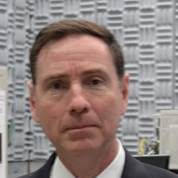
J. Alexander Liddle received his B.A. and D. Phil. degrees in Materials Science from the University of Oxford.
After his appointment in 1990 as a postdoctoral fellow at Bell Laboratories, he spent the next decade working on the research, development, and eventual commercialization of a novel electron-beam lithography technology. He is currently Chief of the Microsystems and Nanotechnology Division at NIST.
His division’s research runs the gamut from quantum nanophotonics to biology. His personal research focus is on nanofabrication and self-assembly for nanomanufacturing. He has published over 275 papers, in areas ranging from electron-beam lithography to DNA-controlled nanoparticle assembly and holds 19 US patents.
He is a fellow of the APS and the Washington Academy of Sciences, and a member of the AVS and MRS. He has served on numerous advisory and program evaluation committees, for NSF, DOE, DARPA, and the Semiconductor Research Corporation.
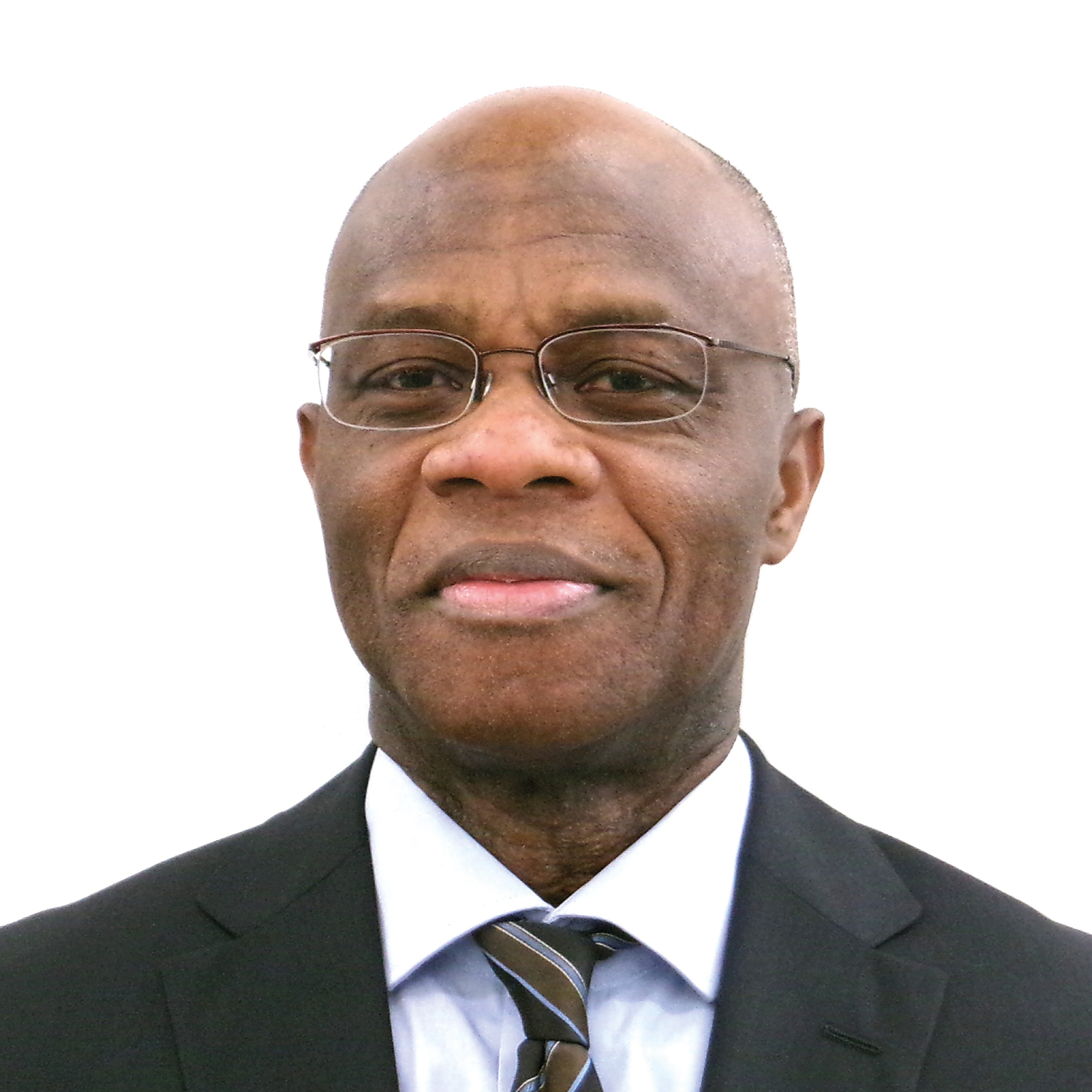
Uzodinma Okoroanyanwu, a research associate professor in the department of polymer science and engineering of University of Massachusetts at Amherst, conducts research aimed at developing functional materials, patterning methods, and devices used in electrochemical energy storage; chemical sensing; printed, flexible, flexible/hybrid and wearable electronics; and electromagnetic interference shielding. He is the founder of Enx Labs, a company that translates some of his research results into devices and instruments that help to improve the human condition and sustain the environment. He worked previously at Advanced Micro Devices, where he spent 12 years conducting research on advanced lithography and on organic polymer memories, and at GLOBALFOUNDRIES, where he spent 4 years conducting research on advanced lithography. He is the author of several books, including Chemistry and Lithography (SPIE Press & John-Wiley & Sons, 2010), Molecular Theory of Lithography (SPIE Press, 2015); Chemistry and Lithography, 2nd ed., Vol. 1: The Chemical History of Lithography (SPIE Press, 2020); and most recently, Chemistry and Lithography, 2nd ed., Vol. 2: Chemistry in Lithography (SPIE Press, 2023). A holder of 37 U.S patents, he was educated at The University of Texas at Austin, where he earned the following degrees: Ph.D. physical chemistry (1997), M.S. chemical engineering (1995), M.A. physical chemistry (1994), B.S. Chemistry and Chemical engineering (1991). He is a fellow of SPIE, the international society for optics and photonics, as well as an associate editor of the Journal of Micro/Nanopatterning, Materials, and Metrology.
Phone: 413 535 8165
E-Mail: uzokoro@umass.edu
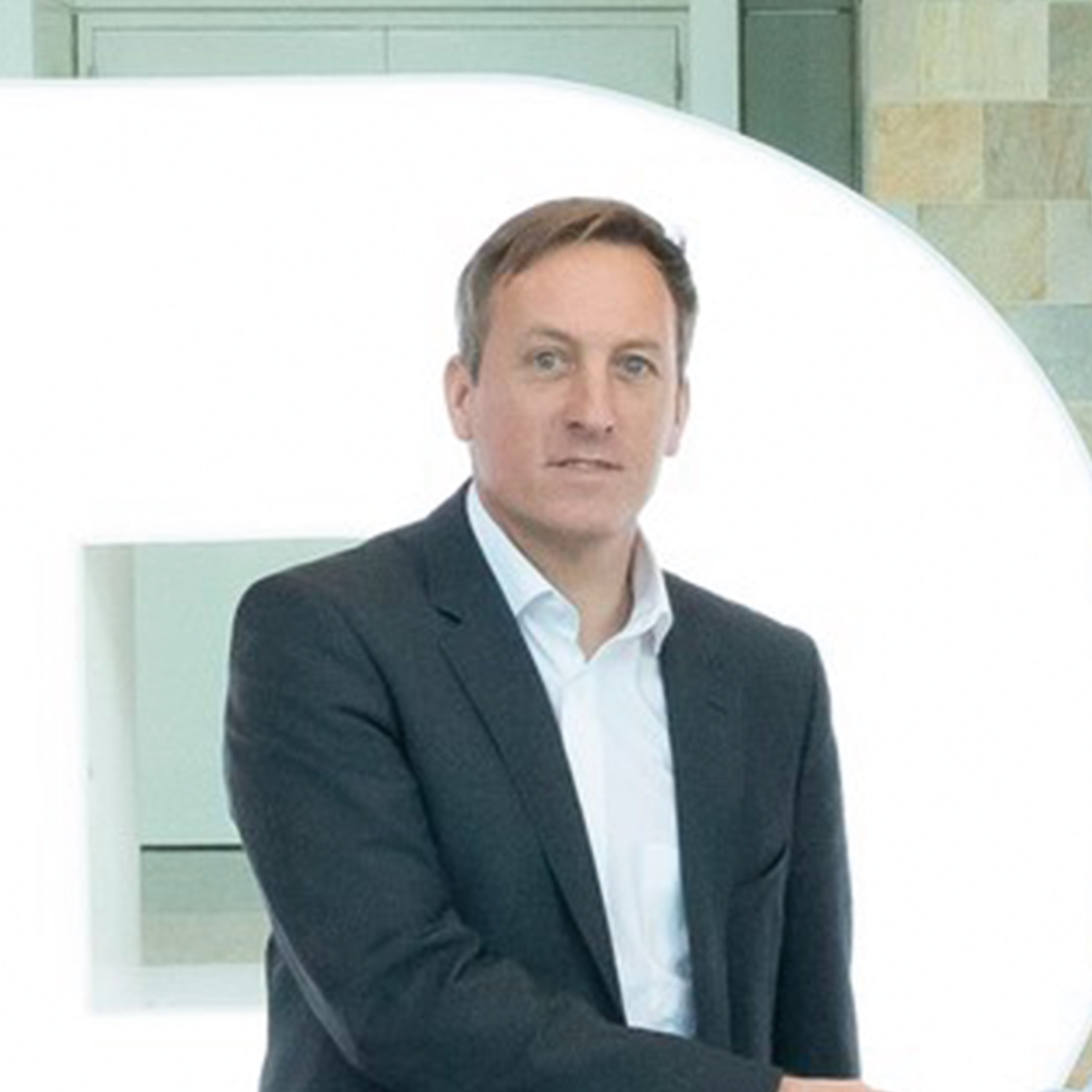
Dr. Thomas Glinsner, Corporate Technology Director, EV Group (EVG)
Dr. Thomas Glinsner is Corporate Technology Director for EV Group (EVG) based at the company’s headquarters in St. Florian, Austria. Dr. Glinsner joined EVG as product manager in 2000. He was appointed as Product Management Director in 2008 and Corporate Technology Director in 2014. In this role, Dr. Glinsner oversees product development for lithography, wafer bonding and nanoimprint lithography. Dr. Glinsner has authored and co-authored several technical papers and presentations on those topics.
Dr. Glinsner graduated with a degree in Technical Chemistry from the Technical University in Vienna. He received his Ph.D. degree from the University of Linz, Solid State and Semiconductor Physics Department, with a thesis on the fabrication of 3D photonic crystals by nanoimprint lithography.
Phone: +43 7712 5311
E-mail: t.glinsner@evgroup.com
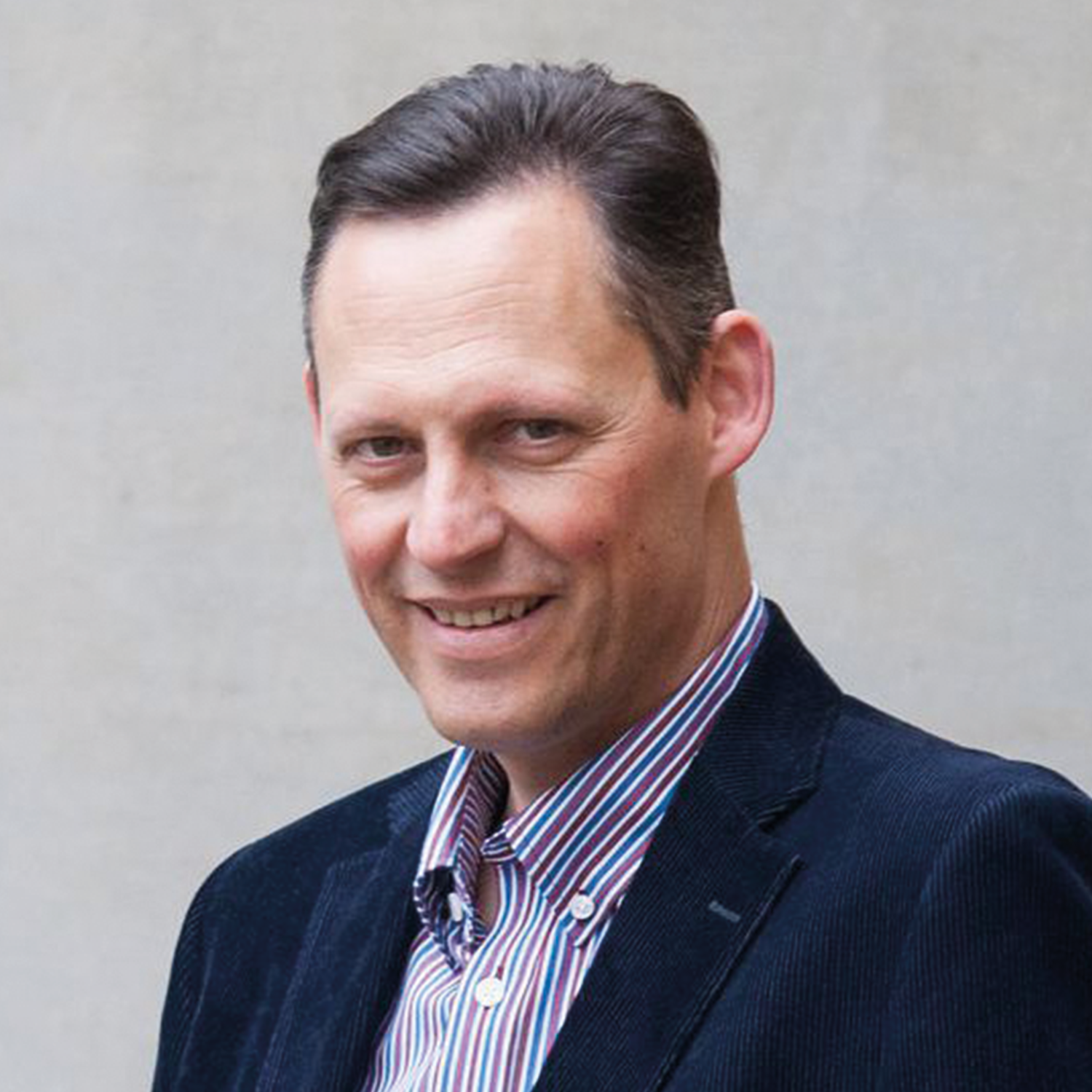
Kurt Ronse, Ph.D. has been working in the field of lithography at imec for over 30 years with responsibilities ranging from lithography researcher, lithography group manager, advanced patterning department director and advanced lithography program director.
Prior to joining imec, Ronse received a Ms. and Ph.D. degree in Electrical Engineering
from the University of Leuven (Belgium).
In 2016, he has been elected Fellow of SPIE for achievements in microlithography and advanced patterning.
Currently is leading the Advanced Patterning Program that is focusing primarily on the enablement of High NA EUV lithography ECO system and on the extendibility of EUVL to the next technology nodes for logic and DRAM. Also the feasibility of exploratory patterning techniques like Directed Self Assembly and Area Selective Deposition are being assessed.
Phone: +32 16 28 13 36
E-Mail: kurt.ronse@imec.be

Bernard has been involved in Optics and Photonics for the past 25 years as an author, instructor, associate professor, engineer, and hardware development manager in academia, start-ups and multinational corporations, with a focus on micro-optics, diffractive and holographic optics. He successively worked on product developments in the fields of optical computing, optical telecom, optical data storage, optical anti-counterfeiting, industrial optical sensors and more recently in immersive displays for augmented and mixed reality systems.
Bernard published several books, holds close to 100 patents, and wrote a few hundred papers on these topics.
He is the 2023 President of the International Society for Optics and Photonics (SPIE). He also set up and chairs various SPIE conferences including the SPIE AR/VR/MR co-located with Photonics West and the SPIE Digital Optical Technologies co-located with Laser Munich. He is also a short course instructor on micro-optics and ARVR displays and hosts the monthly online SPIE AR|VR|MR fireside chats.
Bernard held engineering management positions at Google [X] Labs since 2010 (Google Glass) and Microsoft since 2015 (HoloLens). He is since 2021 the Director for XR engineering at Google in Mountain View, CA.
The MNE2023 Scientific Committee welcome submissions of high quality for 4 thematically focussed issues of Micro and Nano Engineering (MNE by Elsevier), related to the conference topics listed below. There are two different submission types:
MNE poster papers have equal weight to oral presentations. The Scientific Committee will decide on the final format of presentation.
The 4-star Mercure Hotel MOA Berlin is located right in the center of Berlin and is easily accessible by public transport. The Hotel offers perfect conditions for the MNE 2023 m² with 336 rooms & suites, 24/7 reception, restaurant & bar, 440 parking spaces, 40 conference and event rooms on 5,000 m². Exhibitor areas flooded with daylight, short distances between the conference rooms, the best gastronomic supply and professional event support offer the best possible chances of success for the MNE 2023.

EARLY BIRD RATE | available for selected tickets until 14th July 2023 |
|---|---|
Standard rate | 895 € |
Student rate * | 580 € |
REGULAR RATE | valid until 31st August 2023 |
|---|---|
Standard rate | 985 € |
Student rate * | 670 € |
One day attendance | 370 € |
Two days attendance | 700 € |
Accompanying person ** | 170 € |
LATE RATE | no ON-SITE registration / 01st till 24th September 2023 |
|---|---|
Standard rate | 1.080 € |
Student rate * | 670 € |
One day attendance | 420 € |
Two days attendance | 750 € |
Accompanying person ** | 170 € |
Call for Applications: The 2023 Micro and Nano Engineering (Elsevier) Young Investigator Award and Lectureship
Honoring and Promoting a Young researcher active in the fields of Nanofabrication and Nanotechnology for Life Sciences, Physics, Chemistry and Environmental Sciences.
Micro and Nano Engineering (MNE) is an open access, multidisciplinary journal which crosses boundaries from nano to micro to bio, and from science to technologies. The journal focuses on micro-/nano engineering, fabrication and integration of functional nanostructures and surfaces towards intelligent nanomanufacturing; devices and bio-microsystems for medicine, life sciences, chemistry, environmental sciences, and agrofood; and devices and microsystems for physical applications. It is proud to continue the long contribution (1983-2023) in the field of processing for Micro- and Nano-scale Device and System fabrication started by the Microelectronic Engineering (MEE) journal, in particular in the areas beyond electronics, i.e. fabrication of photonic, plasmonic, bioelectronic, electromechanical and fluidic devices and systems and their applications in the broad areas of electronics, energy, life sciences, and environment.
MNE is also proud to continue the series of Young Investigator Awards and Lectureships started in 2014. The Lectureship will be presented at the MNE2023 Conference in September 2023 in Berlin, Germany (https://mne-2023.org/). The Lectureship award will include USD$1,000, plus travel costs (max. USD$1,000) to present the award lecture at the September 2023 MNE conference.
We welcome you to the International Conference on Micro- and Nano Engineering (MNE) 2023. This will be the 49th conference in a series that started in Cambridge in 1975. After the last conferences in Rhodes (2019), Turin (2021) and Leuven (2022), this conference will be held in Berlin 25th to 28th September 2023. The German capital Berlin in the center of Europe is a vibrant city with a long tradition in science and technology.
MNE is the major European conference focusing on micro- and nanofabrication and manufacturing techniques for micro- and nanostructures, devices and microsystems for electronics, photonics, energy, environment, chemistry and life sciences.
The commercial exhibition at MNE is an excellent opportunity to foster existing alliances, promote new businesses, reconnect with existing customers, generate new leads, and interact with leading experts from academia, government labs and industry from around the world.
Corporate sponsorships play an important role in the continued success of the conference by helping to support our community in a variety of ways. Our unique environment will expand your organization’s visibility by increasing your exposure to our community which will help build new and long-lasting relationships. This year, there are Platinum, Gold, Silver and Standard levels, which offer additional benefits to our exhibitors and sponsors. In addition, we offer start-ups the opportunity to present themselves at the Exhibition for a small budget.
We look forward to welcoming you to Berlin in September 2023.
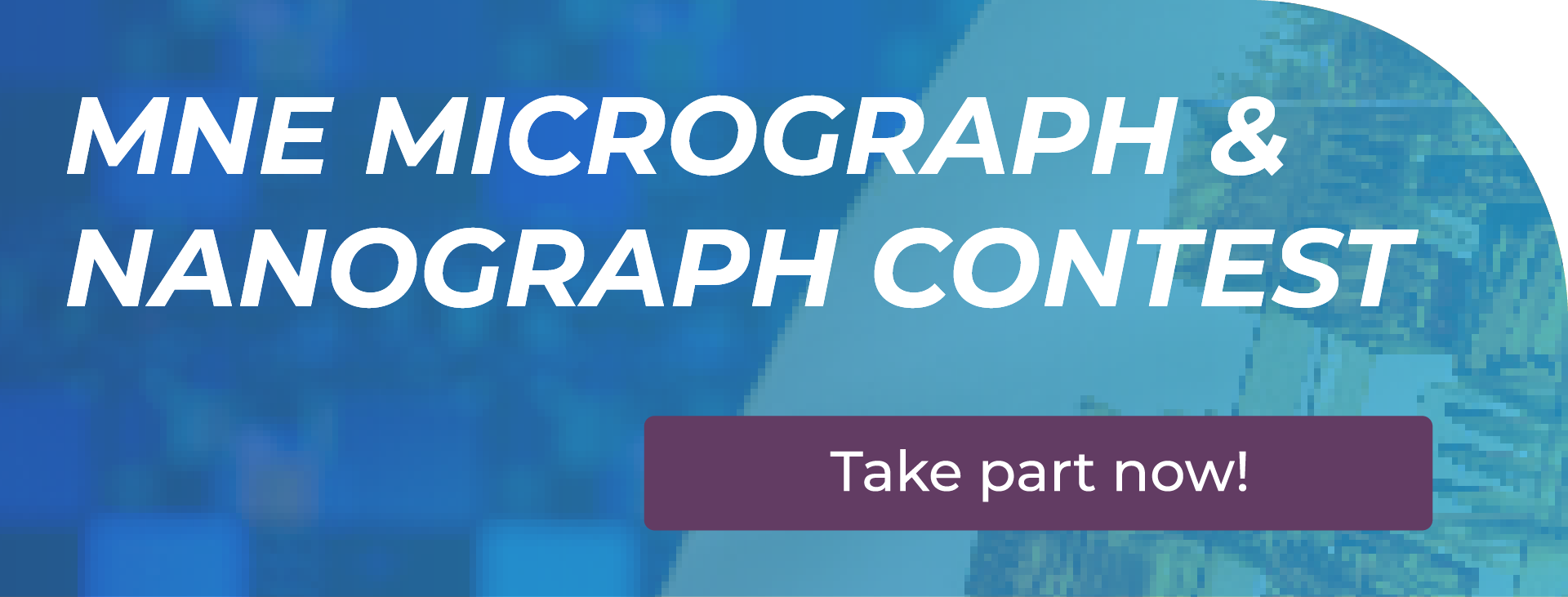
Deadlines
Deadline for abstract submission: June 9th, 2023, 23:59 CES
Topics and subtopics
The complete list of the topics for MNE2023 can be found below. For each topic, there is a wide range of subtopics. Please note that you can only select subtopics within one topic.
Fokus Topic. Next Generation Quantum Computing and related Materials
► Challenges in structure generation and approaches to solutions
► materials and their processing
► Surfaces and interfaces
Topic 1 – Novel Developments in Nano/Micro Fabrication Methods and Processes
► Lithography
► Patterning, including plasma and beam etching
► Materials
► Surface preparation and cleaning
► Computer-aided predictive nanofabrication
Topic 2 – Fabrication and Integration of Micro/Nano Structures, Devices and Systems
► Nanofabrication (other than nanopatterning), nanomanipulation, transfer, bonding technology
► “Smart” (multi-)functional surfaces with wetting, optical and/or biological functionality, plasma surface engineering;
► Use of metamaterials, 2D materials into innovative devices
► Fabrication and Integration of MEMS/NEMS and nanodevices
► Thermoforming (2D-to-3D shaping), injection molding, soft embossing, 3D nanomanufacturing, microprinting and rapid prototyping, additive microfabrication
► System design, simulation and Integration
► Inspection, process control and manufacturability testing
► Packaging technology and reliability
Topic 3 – Micro/Nano Engineering for the Life Sciences
► Bio-inspired technologies. bio-mimetic surfaces
► Packaging, biocompatibility, degradable-/disposable packaging
► Micro and nano fluidic systems and their fabrication
► Processing of nanoparticles: manipulation, detection, sensing, sorting
► Membranes and nanopore technology
► Design, fabrication, recycling of micro-nano devices for life sciences
► Interfacing biomaterials and bio-entities with devices and systems
► New process technologies for life sciences: plasma treatment, beams, etc…
► Applications in health, environmental monitoring, food safety, agrofood, nutrition and agriculture, E-waste reduction, recycling of disposable devices
Topic 4 – Micro/Nano Engineering for Physical and Chemical Applications
► ICT
► Energy
► Physical and chemical sensors
► Optics and photonics, plasmonics
► Phononics/acoustics, thermoelectricity
► Nanomagnetism, data Storage & memory
► Flexible & large area electronics, organic electronics
You have to use this abstract template for submitting your abstract
Deadlines
Deadline for abstract submission: June 9th, 2023, 23:59 CES
The standard/student* rate includes:
– Admission to all sessions, poster and industry exhibition
– All coffee breaks and lunches as per final program
– Conference Materials (including your name badge)
– The Welcome Reception (Monday) and The Conference Dinner (Wednesday)
The One day registration and Two Day registration fees includes:
– Admission to all sessions, poster and industry exhibition on the day of your registration
– All coffee breaks and lunches as per final program
– Conference Materials (including your personal badge)
– Tuesday incl. Welcome Reception (Monday evening), Wednesday incl. Conference dinner
*If you register as a student, please upload a current proof of your student status during registration and carry your student ID with you on the day of the event.
You are eligible for the student fee if you are a student in the academic year 2022-2023.
** Accompanying person
Additional ticket only for social activities (Welcome Reception, Conference dinner incl. Transfer).
Registration deadlines:
– 6th July 2023 – AUTHOR registration deadline
– 30th June 2023 – early bird registration deadline
– 1st September 2023 – regular rate registration deadline
– 24th September 2023 – late rate registration deadline
Registration:
No on-site registration is offered!
Confirmation of registration and payment:
After registering online, you will automatically receive a message confirming your registration. The message will contain all the registration details, payment methods, registration amounts and whether you owe any further payments. If you wish to pay by bank transfer, the message will contain all the necessary details for a bank transfer. After payment, a receipt will be issued and processed in the system.
Payment information:
All payments should be made in advance in Euro (EUR, €). Payments can only be made by credit card (Stripe) or bank transfer.
Payments by credit card are due immediately, payments by bank transfer within 14 days. Please pay any bank fees charged by your bank before transferring the money. We must receive the full amount of your bank transfer in order to pay your invoice and any bank charges for the transfer. This includes any fees charged by your bank. An invoice will be sent after registration/payment. Cash payment will not be available at the MNE2023 reception during the conference.
Cancellation policy:
Cancellations will be accepted in writing only (info@mne-2023.org ) and must be received by the stated cancellation deadline. All refund requests must be made by the attendee or credit card holder. Refund requests must include the name of the attendee, the bank account number used during your transaction and/or the transaction number.
– Written cancellation received by 15th July 2023: 80% refund.
– Written cancellation received from 15th July 2023 until 30th August 2023: 50% refund.
– Written cancellation received on or after 31st August 2023: no reimbursement is possible.
For each cancellation we charge a fee of 50 €.